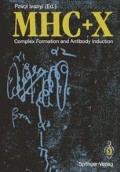Abstract
It has been demonstrated that humoral as well as cellular immune responses take place against chemically induced tumors (Lennox et al. 1981; Ogata et al. 1986). Indeed, syngeneic monoclonal antibodies (McAbs) and antitumor cytotoxic T-lymphocyte responses can be used to define cell surface structures that may be involved in tumor rejection (Simrell and Klein 1979; Fernández Cruz et al. 1987; Wortzel et al. 1983).
Access this chapter
Tax calculation will be finalised at checkout
Purchases are for personal use only
Preview
Unable to display preview. Download preview PDF.
References
Bonal FJ, Pareja E, Martin J, Romero C, Garrido F (1986) Repression of class I H-2K, H-2D antigens on GR9 methylcholanthrene-induced tumour cell clones is related to the level of DNA methylation. J Immunogenet 13: 179–186
Brown JP, Klitzman JM, Hellström I, Nowinski RC, Hellström KE (1978) Antibody response of mice to chemically induced tumors. Proc Natl Acad Sci USA 75: 955–958
Fernández Cruz F, Pérez M, Zabay JM, Garrido F (1987) In vivo generation, enhancement and recruitment of host cellular immune responses against tumor: Influence of MHC antigen expression on clones of tumor cell variants. In: Truitt RL, Gale RB, Bortin MM (eds) Cellular immunotherapy of cancer. Liss, New York: 115–125
Garrido A, Pérez M, Delgado C, Garrido MaL, Rojano J, Algarra I, Garrido F (1986) The influence of class I H-2 gene expression on local tumor growth. Description of a model obtained from clones derived from a solid BALB/c tumor. Clin Exp Immunogenet 3: 99–110
Garrido F (1987) The biological implications of the abnormal expression of histocompatibility antigens on murine and human tumors. In: David CS (ed) H-2 gene, molecules, functions. Plenum, Bar Harbor ME USA Vol 144: 623–639
Garrido F, Pérez M, Torres MD, Garcia Olivares E, Ivanyi P, Schirrmacher V (1979) A syngeneic anti tumor serum recognizing a complex H-2 alloantigen. Immunobiology 156: 110–120
Garrido MaL, Pérez M, Delgado C, Rojano J, Algarra I, Garrido A, Garrido F (1986) Immunogenicity of H-2 positive and H-2 negative clones of a murine tumour GR9. J Immunogenet 13: 159–167
Gomez-Morales M, Ruiz-Cabello F, López Nevot MA, Collado A, Cabrera T, San Miguel J, Garrido F (1985) A monoclonal antibody GR2110 reactive with a P24 antigen present in a subgroup of acute lymphoid leukemias. Hybridoma 4: 369–378
Klein G, Sjogren MO, Klein E, Hellström KE (1960) Demonstration of resistance against methylcholanthrene induced sarcomas in the primary autochthonous host. Cancer Res 20: 1561–1572
Lennox ES, Lowe AD, Cohn J, Evan G (1981) Specific antigens on methylcholanthrene-induced tumors of mice. Transplant Proc 13: 1759–1761
Meschini A, Parmiani G (1978) Anti H-2 alloantibodies elicited by syngeneic immunizations with a chemically induced fibrosarcoma. Immunogenetics 6: 117–123
Ogata M, Shimizu J, Kosaka H, Maekawa R, Shimizu K, Fujiwara H, Hamaoka T (1986) Expression of H-2 antigens and inductibility of antitumor immune responses on various tumor cell clones established from methylcholanthrene-induced fibrosarcomas. Jpn J Cancer Res 77: 1134–1141
Old LJ, Boyse EA, Clarke DA, Garwell E (1962) Antigenic properties of chemically induced tumors. Ann NY Acad Sci 101: 80–106
Plata F, Kalil J, Zilber MT, Fellous M, Levy D (1983) Identification of a viral antigen recognized by H-2 restricted cytolytic T lymphocytes on a murine leukemia virus induced tumor. J Immunol 131: 2551–2556
Prehn RT, Main JM (1957) Immunity to methylcholanthrene-induced sarcomas. JNCI 18: 769–778
Schirrmacher V, Garrido F (1977) Expression of H-2 specificities and of MuLV envelope antigens on murine tumors. In: Eijsvoogel VP (ed) Regulatory mechanisms in lymphocyte activation. Proceedings of the 11th Leukocytes Culture Conference. Academic, New York, pp 379–382
Simrell CR, Klein PA (1979) Antibody responses of tumor-bearing mice to their own tumors captured and perpetuated as hybridomas. J Immunol 123: 2386–2394
Wortzel RD, Philipps C, Schreiber H (1983) Multiple tumour-specific antigens expressed on a single tumour cell. Nature 304: 165–167
Author information
Authors and Affiliations
Editor information
Editors and Affiliations
Rights and permissions
Copyright information
© 1988 Springer-Verlag Berlin Heidelberg
About this paper
Cite this paper
Garrido, A., Algarra, I., Delgado, C., Caballero, A., Pérez, M., Garrido, F. (1988). Syngeneic Monoclonal Antibodies Against Chemically Induced Tumors. In: Ivanyi, P. (eds) MHC + X. Springer, Berlin, Heidelberg. https://doi.org/10.1007/978-3-642-74026-8_15
Download citation
DOI: https://doi.org/10.1007/978-3-642-74026-8_15
Publisher Name: Springer, Berlin, Heidelberg
Print ISBN: 978-3-642-74028-2
Online ISBN: 978-3-642-74026-8
eBook Packages: Springer Book Archive

